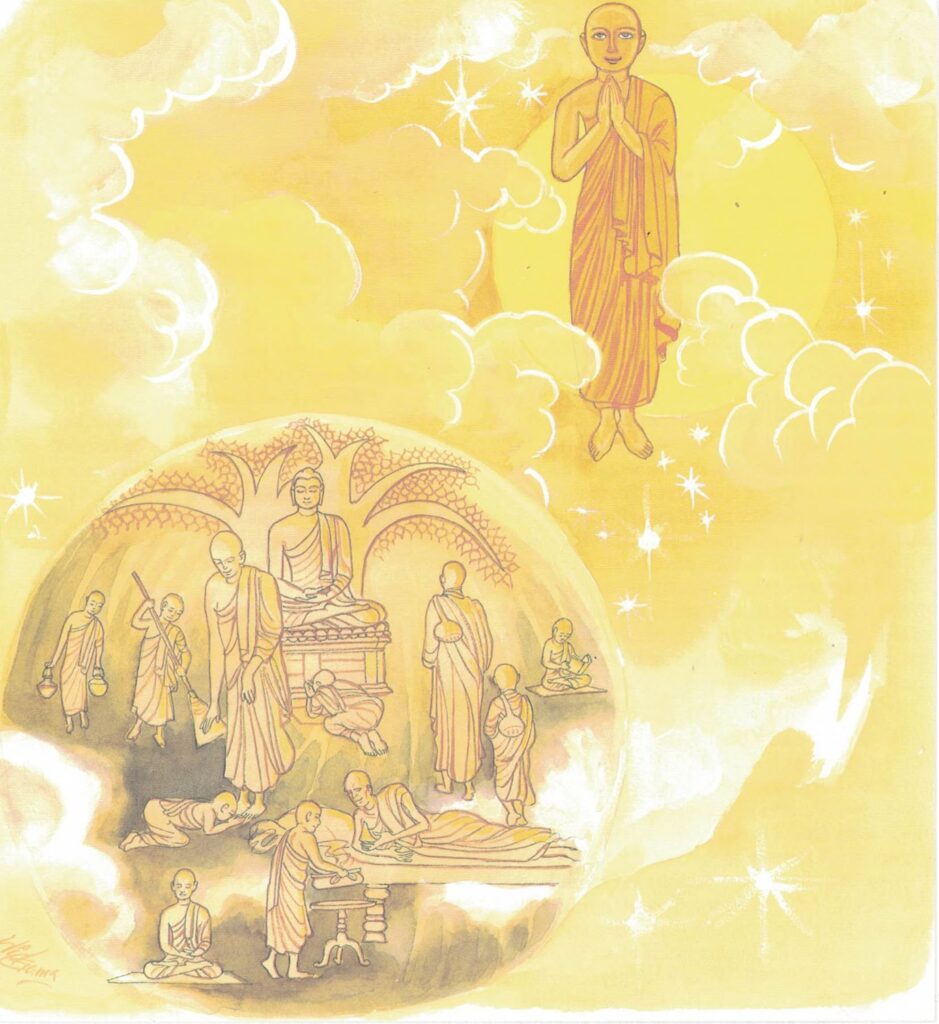Pali text, illustration and English translation of Dhammapada verse 382:
yo have daharo bhikkhu yuñjati buddhasāsane |
so imaṃ lokaṃ pabhāseti abbhā mutto’va candimā || 382 ||
382. Surely that youthful bhikkhu who strives in the Buddha’s Teaching illumines all this world as moon when freed from clouds.

The Story of the Novice Monk Sumana who Performed a Miracle
Sāmanera Sumana was a pupil of Venerable Anuruddha. Although he was very young, due to his past good kamma he became an arahat endowed with supernormal powers. Once, when his teacher Anuruddha was ill, he fetched water from the Anotatta Lake, a lake which was very far away from the monastery and difficult to reach. But because of his supernormal power, he was able to perform the journey through the air. Sometime later, Anuruddha took Sumana to pay homage to the Buddha at the Pubbārāma Monastery.
At the monastery, many sāmaneras teased Sumana and made fun of him because he was very young. The Buddha wanted to make those sāmaneras see the rare qualities of Sumana. So the Buddha announced that he wanted some sāmaneras to get a jar of water from the Anotatta Lake. However, none of them was able to undertake the job. Finally, at the request of Venerable Ānanda, Sumana went to get the jar of water for the Buddha. As before, he went to the Anotatta Lake and came back through the air by his supernormal power.
At the congregation of the monks in the evening, the monks told the Buddha about the wonderful trip made by Sumana. The Buddha said, “Monks, one who practises the Dhamma zealously is capable of attaining supernormal powers, even though he is young.”
Explanatory Translation (Verse 382)
daharo yo bhikkhu Buddhasāsane yuñjati so abbhā
mutto candimā iva imaṃ lokaṃ have pabhāseti
daharo [dahara]: youthful; yo bhikkhu: some monk; Buddhasāsane: in the Teaching of the Buddha; yuñjati: exerts himself; so: that monk; abbhā mutto [mutta]: freed from a cloud; candimā iva:
like the moon; imaṃ lokaṃ [loka]: this world; ha ve: will certainly; pabhāseti: brilliantly illumine
This is true. If a youthful monk exerts himself strenuously in the Teaching of the Buddha, he will certainly illumine the world as brilliantly as a moon emerging from behind a dark cloud that hid it for a while.
Commentary and exegetical material (Verse 382)
This verse is related to a very young novice monk who was capable of performing miracles. These miracles are an outcome of concentrated meditation.
Meditation as a means of self-development is a positive, dynamic force which leads to self-enlightenment, and not a mere negative escape from the uncertainties of life. It is, in fact, the superlative means of awakening the spiritual tendencies of man, so that he obtains two advantages: absolute freedom from vicious tendencies, and the super-normal power of spiritual wisdom.
With the steady increase of concentration during Samādhi meditation the mind becomes free from lower impulses and sensory emotions, and thus, by overcoming hindrances, achieves negative goodness. The self-complacency of negative goodness is inevitably replaced by a living force of higher development which eventually gives rise to positive goodness. When the mind is well established in this positive goodness, it becomes a most admirable instrument which is apt and fit for super-human activities and divine visions such as would appear as miracles to ordinary minds.
The scriptures state that the disciple of meditation becomes skilled in superhuman qualities (uttari-manussa-dhamma) which are the super-normal advantages of his practice. The disciples who have practiced the jhāna method of meditation receive in their lifetime the happiness of experiencing samāpatti, the attainment of the ecstatic state of mental quiescence. In addition to that, those who have practiced the kasiṇa methods receive as supernormal advantages the powers of abhiññā, higher or special knowledge. The visuddhimagga explains these advantages in detail as given in the scriptures.